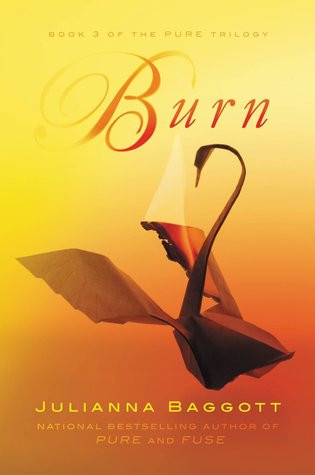Goodreads summary: "Inside the Dome, Patridge has taken his father's place as leader of the Pures. His struggle has led him here, intent upon bringing down the Dome from the inside, with the help of a secret resistance force. But things are not as simple from his new position of power and he finds himself tempted by his father's words: perhaps if the world is to survive it needs the Dome - and Partridge - to rule it...
As Partridge's resolve weakens, Pressia and Bradwell continue piecing together the clues left to them from the time before the Detonations. It is their hope that they will be able to heal the Wretches, and free them from their monstrous fusings and the Dome's oppression once and for all. But everything depends, too, on Partridge. Separated by distance and history, can they still trust their friend and ally? Or is the world doomed to an eternity of war and hardship?"
Burn was a mediocre resolution to a series that, as I have said, was probably better than I gave it credit for, but ultimately failed to grab me.
As Partridge's resolve weakens, Pressia and Bradwell continue piecing together the clues left to them from the time before the Detonations. It is their hope that they will be able to heal the Wretches, and free them from their monstrous fusings and the Dome's oppression once and for all. But everything depends, too, on Partridge. Separated by distance and history, can they still trust their friend and ally? Or is the world doomed to an eternity of war and hardship?"
Burn was a mediocre resolution to a series that, as I have said, was probably better than I gave it credit for, but ultimately failed to grab me.
The key factors that left me unimpressed by the conclusion were a complete unraveling of Partridge's characterization and and ending that wasn't really, in my view, an ending. As the plot summary suggests, Partridge begins to feel concern and sympathy for the citizens inside the Dome, after two novels of nearly all of the primary characters despising them. Though the Pures were silently complicit in the massacre of human beings outside of the Dome by following the lead of Partridge's father, at this point they are weak, sheltered, and wholly unable to process the repercussions of the Detonations on life outside of the Dome. At Partridge's admonitions that they should accept their responsibility and assist those outside with rehabilitation and re-integration, many of the Pures go insane with guilt and begin committing suicide en masse. (This teetered on the edge of eye-rolling for me, but go with me here.) The point that Partridge was meant to gather is that it's not necessarily more good to sacrifice the lives and well-being of all of those in the Dome for the sake of bringing justice for those outside of it. This lesson is fair and warranted, but the way that Partridge steps into that role felt wholly unsatisfying. For one thing, he is essentially bullied and blackmailed into submission by a character who is still ostensibly evil, and there are no repercussions. For another, when he is reunited with Pressia under unseemly circumstances, he becomes defensive and antagonistic at Pressia's completely understandable negative reaction. Where the first two books pegged him as a rather empathetic, righteous character, here he is lost and confused and seems eventually to accept self-preservation above all other leadership tactics. If character assassination is what Baggott intended here, then fine, but I'm not sure that it was her goal.
The only character who really triumphs, here, is Lyda, which I was happy about. This all, though, came after a good 75% of the book had her frittered away in some locked room going all Yellow Wallpaper on herself. It's a fine bit of revenge to have her end up nearly exactly where she'd like to be, but the same 75% that wastes Lyda's talents also dolorously wade through a whole lot of useless talking, arguing, angst, and re-hashing of redundant character ideologies before finally making it to the final showdown. This showdown, then, at the very bitter end, is abruptly cut in half. I don't need bows and strings, but I would like a sense that the book or series ends somewhere differently from where it started, or, conversely, that the overarching lesson is perhaps that "things won't ever change" or some other similar platitude. Granted, literally speaking, this book ends in battle where the series started in restlessness, but as a reader I don't even have the luxury of making educated guesses or creating my own interpretations of how the story progresses after the conclusion because there are really no clues or platforms to build such theories on. I could just as convincingly argue that everyone is cured and made Pure as that everyone ends up dead.
Anyway, if you're out of the YA range, I'm not sure this one will really work for you. The angst and lovey sideplots might make for a bit of intrigue for younger readers but for me they were rote and strictly secondary to a primary plot that already wore thin.


No comments:
Post a Comment